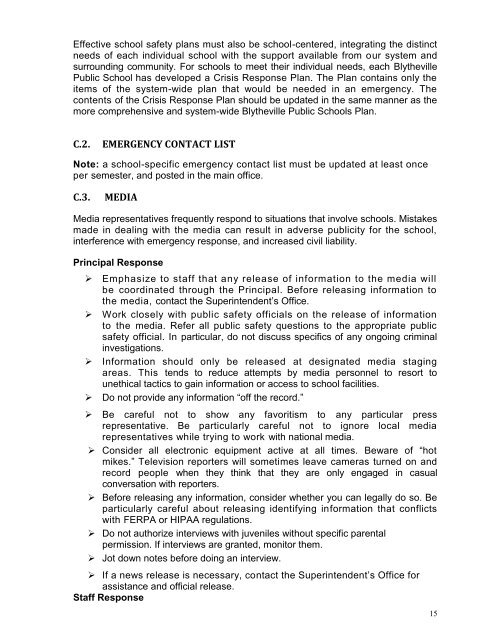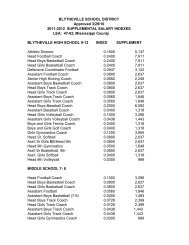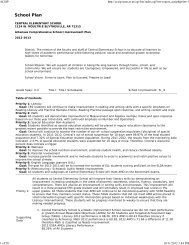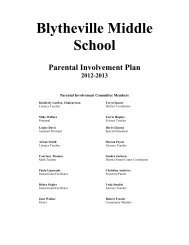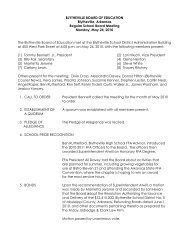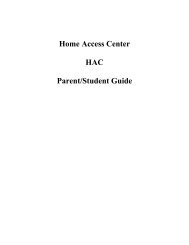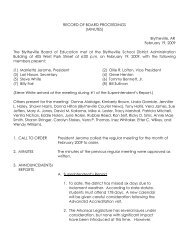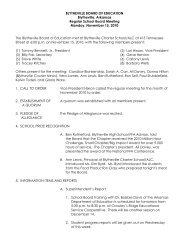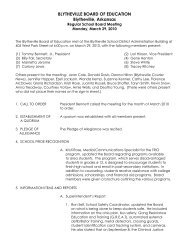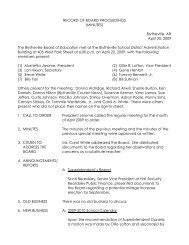District-Wide Safe Schools and Crisis Plan - Blytheville Public Schools
District-Wide Safe Schools and Crisis Plan - Blytheville Public Schools
District-Wide Safe Schools and Crisis Plan - Blytheville Public Schools
Create successful ePaper yourself
Turn your PDF publications into a flip-book with our unique Google optimized e-Paper software.
Effective school safety plans must also be school-centered, integrating the distinct<br />
needs of each individual school with the support available from our system <strong>and</strong><br />
surrounding community. For schools to meet their individual needs, each <strong>Blytheville</strong><br />
<strong>Public</strong> School has developed a <strong>Crisis</strong> Response <strong>Plan</strong>. The <strong>Plan</strong> contains only the<br />
items of the system-wide plan that would be needed in an emergency. The<br />
contents of the <strong>Crisis</strong> Response <strong>Plan</strong> should be updated in the same manner as the<br />
more comprehensive <strong>and</strong> system-wide <strong>Blytheville</strong> <strong>Public</strong> <strong>Schools</strong> <strong>Plan</strong>.<br />
C.2. EMERGENCY CONTACT LIST<br />
Note: a school-specific emergency contact list must be updated at least once<br />
per semester, <strong>and</strong> posted in the main office.<br />
C.3. MEDIA<br />
Media representatives frequently respond to situations that involve schools. Mistakes<br />
made in dealing with the media can result in adverse publicity for the school,<br />
interference with emergency response, <strong>and</strong> increased civil liability.<br />
Principal Response<br />
Emphasize to staff that any release of information to the media will<br />
be coordinated through the Principal. Before releasing information to<br />
the media, contact the Superintendent’s Office.<br />
Work closely with public safety officials on the release of information<br />
to the media. Refer all public safety questions to the appropriate public<br />
safety official. In particular, do not discuss specifics of any ongoing criminal<br />
investigations.<br />
Information should only be released at designated media staging<br />
areas. This tends to reduce attempts by media personnel to resort to<br />
unethical tactics to gain information or access to school facilities.<br />
Do not provide any information “off the record.”<br />
Be careful not to show any favoritism to any particular press<br />
representative. Be particularly careful not to ignore local media<br />
representatives while trying to work with national media.<br />
Consider all electronic equipment active at all times. Beware of “hot<br />
mikes.” Television reporters will sometimes leave cameras turned on <strong>and</strong><br />
record people when they think that they are only engaged in casual<br />
conversation with reporters.<br />
Before releasing any information, consider whether you can legally do so. Be<br />
particularly careful about releasing identifying information that conflicts<br />
with FERPA or HIPAA regulations.<br />
Do not authorize interviews with juveniles without specific parental<br />
permission. If interviews are granted, monitor them.<br />
Jot down notes before doing an interview.<br />
If a news release is necessary, contact the Superintendent’s Office for<br />
assistance <strong>and</strong> official release.<br />
Staff Response<br />
15


